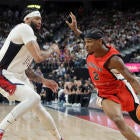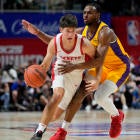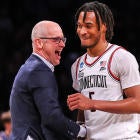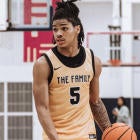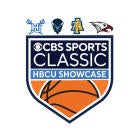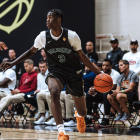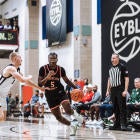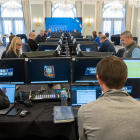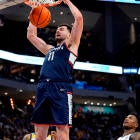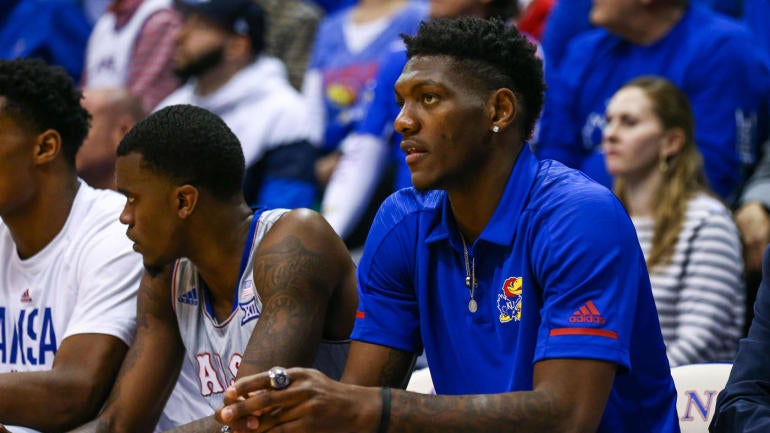
The NCAA moonstomped over the remains of Kansas big man Silvio De Sousa's college career on Friday evening, handing out one of the stronger punishments in its history against a Division I men's basketball player.
The Jayhawks sophomore, who has not played a game in 2018-19, has been ruled ineligible for the remainder of this season and the entirety of 2019-20. De Sousa's two-year ban by the Student-Athlete Reinstatement Committee comes four days removed from former Miami player Dewan Hernandez being given a suspension that would last nearly a season and a half.
Hernandez promptly declared for the NBA Draft and left college after the NCAA's verdict came down.
De Sousa may well do the same in short order. Kansas will appeal, but those official countermoves seldom succeed.
De Sousa's guilty of having a guardian allegedly seek money for his basketball services. He's guilty, so far as we can tell, of being a teenager incapable of altering the motivations of an adult. The NCAA can't punish the adult (Fenny Falmagne) directly, so it is slashing the career (with real long-term implications on De Sousa's professional prospects) of a 20-year-old.
"The only people that are getting hurt here are the kids," one coach who's felt the effects of NCAA investigations told CBS Sports. "The kids are actually being preyed upon by adults and for that they are punished. Most American citizens, if they look at the rules and the things the kids have to agree to, to be eligible, the declarations themselves are criminal if you really look at it."
Kansas reacted about as harshly as you'll ever see from an athletic director and a coach.
"We are shocked and incensed by today's decision," Kansas AD Jeff Long said. "This was clearly an unfair and punitive ruling for a young man who had no knowledge of any NCAA violation, nor did Silvio personally benefit from the violation."
Bill Self took direct aim on Indianapolis, all but daring the NCAA to try and dream up something worse.
"In my 30-plus years of coaching college basketball, I have never witnessed such a mean-spirited and vindictive punishment against a young man who did nothing wrong," Self said. "To take away his opportunity to play college basketball is shameful and a failure of the NCAA."
There's still more coming for Kansas. De Sousa played 20 games last season, including at the Final Four. After what the NCAA did to Louisville and its official vaporizing of the 2012-13 national championship, is there any reason to believe KU won't be forced to vacate its records for 2017-18? That's what made Self's statement and its severity so surprising.
But maybe he doesn't give a damn about the official records, or the banner, or 14 straight official Big 12 titles. Because on some level Self has to feel responsible for how all of this has gone down. It's his program, his player and now a punishment so savage that it borders on malicious. De Sousa is the one being hurt and affected most, but it's a stain on Self all the same. He's had NCAA complications before, but never to this magnitude.
Let the record show, however, that while assistant coaches have pleaded guilty and Rick Pitino was fired by Louisville, the only people who have been punished by the NCAA to this point are the players. De Sousa, Hernandez and Brian Bowen all received extensive suspensions.
Head coaches have yet to be held accountable.
Many in the business maintain the NCAA will turn a blind eye. Because, in an effort to clean up its schools and would-be yardbirds, the NCAA has twisted itself into a constrictor-knot stance. Of course, if schools and family members of prospects wanted to get around the cheating, they could always use the my-child-didn't-know logic. It worked for Cam Newton at Auburn.
But then this rule was applied.
So some sort of punishment had to come down.
But two years? It's not a statement, it's a rebuke so harsh the NCAA comes off as soulless. Let me be clear: You have to punish De Sousa in a situation like this. To not punish is to encourage more loophole-jumping. Preventative measures are necessary in absence of blowing up the whole arrangement. (And many want to see the dynamite.) But there's a chasm between letting someone walk free and putting them in what amounts to a near-life sentence in college athletics.
Why not be creative in adjudication? The Student-Athlete Reinstatement Committee should have ruled De Sousa ineligible for 2018-19. That's it. It's a bitter pill, but still sends a message and is understandable. Then you keep Kansas on the hook this way: allow De Sousa to transfer and be eligible next season at the school of his choice, pending NCAA -- and conference -- clearance. That way you are abiding by a strong rule but not entirely railroading a player who very well may have been entirely innocent.
"University of Kansas men's basketball student-athlete Silvio De Sousa must sit out the remainder of the 2018-19 season and the 2019-20 season because his guardian received payment from a university booster and agent and agreed to receive additional funds from the same person."
Those are the exact words from the NCAA, which no doubt also used information provided in federal court, via sworn testimony, that brought this matter to light. (De Sousa was not preemptively sat by KU until Oct. 24, the same day Christian Dawkins, James Gatto and Merl Code were all found guilty of wire fraud.)
"According to the facts provided for purposes of the reinstatement request, De Sousa's guardian received payment of $2,500 from an agent and booster of the school," the NCAA claims. "He agreed to accept additional payment of $20,000 from the same individual and an Adidas employee for securing De Sousa's enrollment at Kansas."
The unnamed person referenced above is T.J. Gassnola, who agreed to a deal with the government in exchange for testimony against Adidas' representatives in October's highly publicized trial. What makes this whole thing potentially even more piteous: Falmagne told the Kansas City Star that he gave the $2,500 in question he received from Gassnola went to a church and claims receipts can prove him right.
The De Sousa ruling also reminds us of how much is still left untouched, if not fully investigated at this point, with all that was revealed in New York City federal court in October.
A transcript of a tapped phone call between Kansas assistant Kurtis Townsend and Code, read aloud in court in October, details that Zion Williamson's family was potentially seeking benefits in exchange for the possibility of the superstar prospect to play at KU. Townsend, who has been active the entire season as a KU assistant, responds to Code: "I've got to just try to work and figure out a way because if that's what it takes to get him here for 10 months, we're going to have to do it some way."
A source previously told CBS Sports that Duke vetted Williamson's situation extensively -- well before that information came out at trial. But the De Sousa punishment only stokes the awkward public curiosity about the particulars surrounding Williamson's recruitment.
There is still so much left to sort through and many decisions, punishments, non-punishments and who knows what else that's still to come.
It's hard to square how the NCAA's decision-makers responsible for rulings like this can truly be satisfied with what they did to De Sousa. It feels vengeful, nasty. It feels like there has to be a better way.
But it also feels like the NCAA is incapable of changing it, even if it wants to. The coaches and programs can wait. We'll just have to see when and if their time comes. The players are the ones forced to take the worst first.









